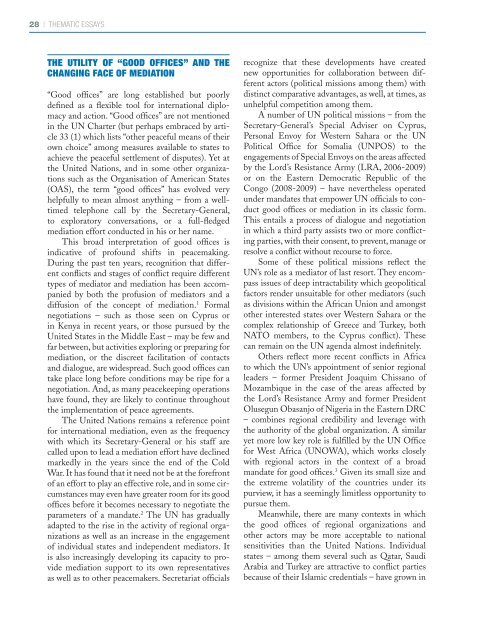here - Center on International Cooperation - New York University
here - Center on International Cooperation - New York University
here - Center on International Cooperation - New York University
Create successful ePaper yourself
Turn your PDF publications into a flip-book with our unique Google optimized e-Paper software.
28 | Thematic EssaysThe utility of “good offices” and thechanging face of mediati<strong>on</strong>“Good offices” are l<strong>on</strong>g established but poorlydefined as a flexible tool for internati<strong>on</strong>al diplomacyand acti<strong>on</strong>. “Good offices” are not menti<strong>on</strong>edin the UN Charter (but perhaps embraced by article33 (1) which lists “other peaceful means of theirown choice” am<strong>on</strong>g measures available to states toachieve the peaceful settlement of disputes). Yet atthe United Nati<strong>on</strong>s, and in some other organizati<strong>on</strong>ssuch as the Organisati<strong>on</strong> of American States(OAS), the term “good offices” has evolved veryhelpfully to mean almost anything – from a welltimedteleph<strong>on</strong>e call by the Secretary-General,to exploratory c<strong>on</strong>versati<strong>on</strong>s, or a full-fledgedmediati<strong>on</strong> effort c<strong>on</strong>ducted in his or her name.This broad interpretati<strong>on</strong> of good offices isindicative of profound shifts in peacemaking.During the past ten years, recogniti<strong>on</strong> that differentc<strong>on</strong>flicts and stages of c<strong>on</strong>flict require differenttypes of mediator and mediati<strong>on</strong> has been accompaniedby both the profusi<strong>on</strong> of mediators and adiffusi<strong>on</strong> of the c<strong>on</strong>cept of mediati<strong>on</strong>. 1 Formalnegotiati<strong>on</strong>s – such as those seen <strong>on</strong> Cyprus orin Kenya in recent years, or those pursued by theUnited States in the Middle East – may be few andfar between, but activities exploring or preparing formediati<strong>on</strong>, or the discreet facilitati<strong>on</strong> of c<strong>on</strong>tactsand dialogue, are widespread. Such good offices cantake place l<strong>on</strong>g before c<strong>on</strong>diti<strong>on</strong>s may be ripe for anegotiati<strong>on</strong>. And, as many peacekeeping operati<strong>on</strong>shave found, they are likely to c<strong>on</strong>tinue throughoutthe implementati<strong>on</strong> of peace agreements.The United Nati<strong>on</strong>s remains a reference pointfor internati<strong>on</strong>al mediati<strong>on</strong>, even as the frequencywith which its Secretary-General or his staff arecalled up<strong>on</strong> to lead a mediati<strong>on</strong> effort have declinedmarkedly in the years since the end of the ColdWar. It has found that it need not be at the forefr<strong>on</strong>tof an effort to play an effective role, and in some circumstancesmay even have greater room for its goodoffices before it becomes necessary to negotiate theparameters of a mandate. 2 The UN has graduallyadapted to the rise in the activity of regi<strong>on</strong>al organizati<strong>on</strong>sas well as an increase in the engagementof individual states and independent mediators. Itis also increasingly developing its capacity to providemediati<strong>on</strong> support to its own representativesas well as to other peacemakers. Secretariat officialsrecognize that these developments have creatednew opportunities for collaborati<strong>on</strong> between differentactors (political missi<strong>on</strong>s am<strong>on</strong>g them) withdistinct comparative advantages, as well, at times, asunhelpful competiti<strong>on</strong> am<strong>on</strong>g them.A number of UN political missi<strong>on</strong>s – from theSecretary-General’s Special Adviser <strong>on</strong> Cyprus,Pers<strong>on</strong>al Envoy for Western Sahara or the UNPolitical Office for Somalia (UNPOS) to theengagements of Special Envoys <strong>on</strong> the areas affectedby the Lord’s Resistance Army (LRA, 2006-2009)or <strong>on</strong> the Eastern Democratic Republic of theC<strong>on</strong>go (2008-2009) – have nevertheless operatedunder mandates that empower UN officials to c<strong>on</strong>ductgood offices or mediati<strong>on</strong> in its classic form.This entails a process of dialogue and negotiati<strong>on</strong>in which a third party assists two or more c<strong>on</strong>flictingparties, with their c<strong>on</strong>sent, to prevent, manage orresolve a c<strong>on</strong>flict without recourse to force.Some of these political missi<strong>on</strong>s reflect theUN’s role as a mediator of last resort. They encompassissues of deep intractability which geopoliticalfactors render unsuitable for other mediators (suchas divisi<strong>on</strong>s within the African Uni<strong>on</strong> and am<strong>on</strong>gstother interested states over Western Sahara or thecomplex relati<strong>on</strong>ship of Greece and Turkey, bothNATO members, to the Cyprus c<strong>on</strong>flict). Thesecan remain <strong>on</strong> the UN agenda almost indefinitely.Others reflect more recent c<strong>on</strong>flicts in Africato which the UN’s appointment of senior regi<strong>on</strong>alleaders – former President Joaquim Chissano ofMozambique in the case of the areas affected bythe Lord’s Resistance Army and former PresidentOlusegun Obasanjo of Nigeria in the Eastern DRC– combines regi<strong>on</strong>al credibility and leverage withthe authority of the global organizati<strong>on</strong>. A similaryet more low key role is fulfilled by the UN Officefor West Africa (UNOWA), which works closelywith regi<strong>on</strong>al actors in the c<strong>on</strong>text of a broadmandate for good offices. 3 Given its small size andthe extreme volatility of the countries under itspurview, it has a seemingly limitless opportunity topursue them.Meanwhile, t<str<strong>on</strong>g>here</str<strong>on</strong>g> are many c<strong>on</strong>texts in whichthe good offices of regi<strong>on</strong>al organizati<strong>on</strong>s andother actors may be more acceptable to nati<strong>on</strong>alsensitivities than the United Nati<strong>on</strong>s. Individualstates – am<strong>on</strong>g them several such as Qatar, SaudiArabia and Turkey are attractive to c<strong>on</strong>flict partiesbecause of their Islamic credentials – have grown in
















